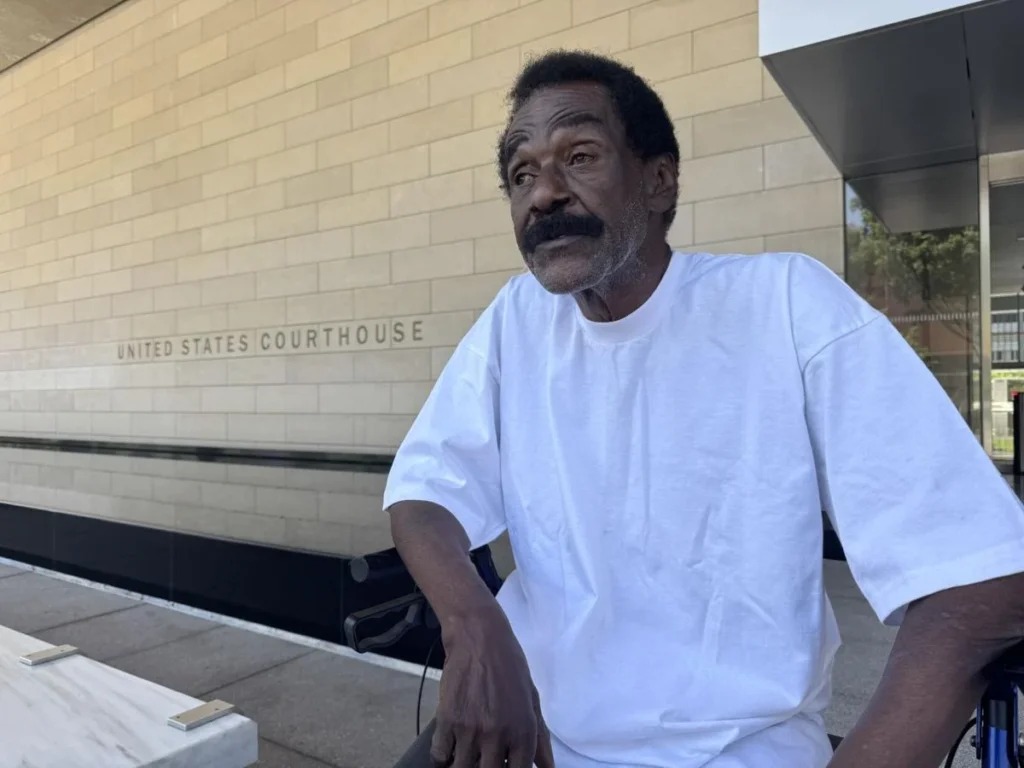
Charles Nelson, 78, rests on his walker outside the federal courthouse Thursday following a hearing in the LA Alliance homelessness case. Photo: JAMIE PAIGE
The City of Los Angeles has received its first bill from powerhouse law firm Gibson, Dunn & Crutcher for defending the city in a high-profile homelessness lawsuit — a $1,812,922.78 invoice that arrived July 18 and covers work from May 19 to May 31, including a week of trial preparations and four of the seven days of a federal evidentiary hearing.
The 58-page invoice, heavily redacted, lists charges for meals, courier services and parking alongside $1.79 million in legal fees. Among the unredacted expenses: a $478 bill at Zankou Chicken, two separate charges of roughly $400 each at Tender Greens, and multiple messenger deliveries of binders and food to courthouses.
“We are in the process of reviewing the invoice,” said Ivor Pine, a spokesperson for the City Attorney’s Office.
Gibson, Dunn & Crutcher were hired because of the LA Alliance for Human Rights lawsuit, filed in 2020 by a coalition of business owners, residents, and nonprofit leaders who accused the city of failing to address its homelessness crisis.
The case was later settled, with the city agreeing to create thousands of new shelter beds under a court-enforced plan. But according to court filings, the city failed to fully implement that agreement.
During discovery, a court-ordered audit found more than $2 billion in homelessness spending could not be fully tracked. Those findings led U.S. District Judge David O. Carter to order an evidentiary hearing, prompting the city to retain Gibson Dunn as outside counsel.
In a 62-page ruling issued after the May hearing, Carter found the city had missed deadlines, misrepresented data, and withheld documentation in carrying out legally binding homelessness agreements. While he stopped short of placing the city’s programs under outside control, he ordered tighter court oversight, including the appointment of a third-party monitor to audit city data, quarterly compliance hearings, and a revised shelter bed plan by Oct. 3.
In a statement about the firm’s work, Pine said Gibson Dunn “did an outstanding job of stepping into a crucial matter that had been in litigation for nearly five years before they were hired” and, without prior discovery or knowledge of the case, prepared for and conducted a two-week trial with numerous witnesses.
He said the preparation level was on par with “what would have been necessary for a full-blown trial” and that a separate work stream was devoted to motion practice and potential appellate briefings. Pine added that the firm “compressed what would normally be years worth of work into a very short time period” and that its professionalism, preparedness, communication, and competence “exceeded our expectations and delivered exceptional results and seamless representation.”
The Current reached out to Tim Campbell, a Westchester resident and former municipal performance audit manager who has written extensively on the case. Campbell, who prioritizes outcomes over process, said hiring Gibson Dunn “just before the hearings started” at $1,300 an hour signaled the city’s intent to appeal Carter’s ruling if it went against them.
He noted that during the June hearings, the firm’s attorneys “objected to almost every question and response” despite being repeatedly overruled, never refuted the Alvarez & Marsal audit findings, and instead sought to discredit the auditors.
Campbell criticized the city for spending millions on outside counsel while claiming a billion-dollar budget shortfall. “Rather than admitting A&M did exactly what the City agreed it should do — find problems in L.A.’s homelessness programs — the City is willing to spend millions defending a system its own leaders admit is broken,” he said, adding that the cost to taxpayers will extend far beyond the $1.8 million bill if the city continues to defend “the status quo.”
The City Council initially approved a $900,000 contract for Gibson Dunn for up to three years, but exceeding that amount required written approval from the city attorney. The firm quickly surpassed the threshold, billing double the authorized amount within its first month on the case.
In an L.A. Times story about the invoice, Councilmember Bob Blumenfield, who serves on the homelessness committee, said he was “not happy” about the $1.8 million bill but would reserve further comment until receiving more details. Councilmember Tim McOsker, co-author of a motion seeking regular litigation updates, also said he had not been informed. His spokesperson, Sophie Gilchrist, told the paper he is requesting the matter be brought before the City Council immediately “so the City Attorney can provide a full accounting and discuss all invoices related to the case.”
Gibson Dunn has since filed notice of the city’s intent to appeal portions of Carter’s ruling. The judge also signaled he may order the city to pay the legal fees of the LA Alliance and other intervening homeless advocacy groups, which have requested a combined $1.5 million.
The City Attorney’s Office says it continues to work with Gibson Dunn on the case and would “be pleased to work with them again on appropriate significant matters.”
(Editor’s note: the story first printed in the Westside Current on August 13, is reprinted with permission. In an email Campbell added “it’s clear the CA intends to continue paying Gibson Dunn well into the future. Those of us who live in the City of LA should contact our Councilmember office ask that the Council do its fiduciary duty and review these expenses.”)

I’m wondering what was the point of publishing the photo of Charles Nelson.
I wondered the same thing about the photo of Charles Nelson.
He was downtown listening to the hearings–why read more into it?